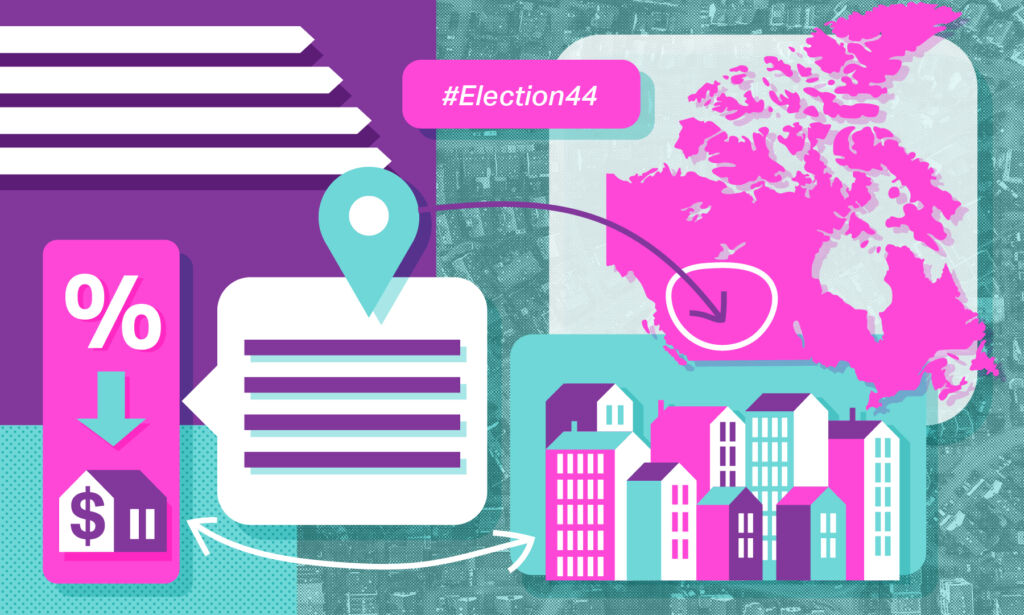In this federal election, parties continue to treat renting a home as a phase, as an undesirable situation that people must overcome. This perspective is not only out of touch with the reality of a large share of the population, but it also thwarts a much-needed debate on how to make renting a suitable alternative to homeownership.
The Liberal platform is the bluntest in this regard; it claims "everyone should have a home to call their own." Accordingly, many of the measures the party puts forward focus on prospective first-time home buyers, but they would benefit only a small share of tenants.
Take the proposed tax-free home savings account, for example. It purportedly combines the best features of an RRSP and a TFSA to help families afford a down payment faster. The problem is, most tenant families currently have no money in either of those types of accounts. According to the most recent data available, 70% of tenant households have zero dollars in TFSAs; 75% have zero dollars in RRSPs. The savings instrument doesn't seem to be the problem as much as the lack of money to put in it. The proposed program is also limited to Canadians under 40 years of age. Is everyone supposed to have grown out of renting by that age?
The NDP dials down the white picket fence narrative, presenting access to good rental homes as important as homeownership. Still, the party makes the common mistake of focusing only on two groups of renters: those who would be eligible for affordable housing and those for whom homeownership may become a viable option. The party seems to leave those who don't fit these categories to fend for themselves. The problem is, that's more than half of all tenant families.
According to the 2018 Canadian Housing Survey, the average income of families living in social and affordable rental housing is $32,000. The average income of families who bought their first home within the past five years is $108,000. Close to 60% of tenant families make more than $32,000 and less than $108,000. No one is coming for them.
The Conservative platform doesn't explicitly celebrate homeownership, but it also doesn't include any measures directly supporting renters. The term rental housing appears only in a proposal to defer tax gains for developers selling and re-buying rental property. The rationale behind this and similar proposals is that supply is the only problem; if developers could simply do more of what they presently do, with fewer rules and more government subsidies, the housing crisis would go away. Real estate industry pundits have been making this argument for decades. The problem is, their job is to defend the interest of developers and corporate landlords, not those of tenants.
Here's what we should be talking about in this election campaign:
- A plan to build large numbers of truly affordable rental housing every year, year after year, indeterminately—with or without private sector partnership.
- A plan to purchase and nationalize considerable parts of the existing stock to make or keep it affordable until we grow affordable rental housing capacity.
- A national rent control policy.
That would be in contrast to current proposals to build affordable rental housing that isn't affordable, through one-off plans to build this or that number of units in this or that period. These plans always depend on private developers deciding it is lucrative to participate in government schemas or non-profit providers being able to mount the capacity to participate in government programs—both of which are big "ifs."
We are also not hearing about a national rent freeze for the remainder of this pandemic and the first recovery years. Instead, we will allow financially insecure tenant households to deal with this economic aftermath of COVID-19 on their own while corporate landlords breeze through it.
No one is talking about a national tenants’ rights bill that would trigger an eviction moratorium whenever unemployment rates surpass a determined threshold or governments enact mandatory lockdowns. This bill would also make easier to press charges against negligent landlords.
It's time to shift the housing debate. Renting is not a phase. It is — and has always been—the reality for a large share of Canadian households.
Parties also don't seem interested in talking about a national rent control policy that includes vacancy controls. This is the more straightforward way to ensure rents don't rise faster than inflation and wages and remained coupled with the local economy and labour market.
Some will say this is a provincial matter. Well, social housing used to be a federal matter, then it was downloaded onto provinces, some of whom downloaded it onto municipalities, and now the federal government is reluctantly getting back into the game. Child care used to be a provincial matter until a couple of weeks ago, and now that's all federal parties talk about.
The federal government has the means to implement a countrywide rent control policy. It would cost nothing. And could even mean savings in programs like the Canada Housing Benefit, whose cost go up with rents, which are out of control.
These are just some examples of measures that would have a concrete, immediate and long-term impact on tenants' lives. Tenants who, due to a myriad of life circumstances, may never be able or interested in taking on hundreds of thousands of dollars in mortgage debt, but who may also never fall below the income level that would qualify them for housing subsidies. They have the right to keep a larger share of their income, enjoy life, take care of their families, and build financial security through other means than real estate acquisition.
It's time to shift the housing debate. Renting is not a phase. It is — and has always been—the reality for a large share of Canadian households. Governments should stop trying to rescue tenants and focus more on enforcing their economic rights.







